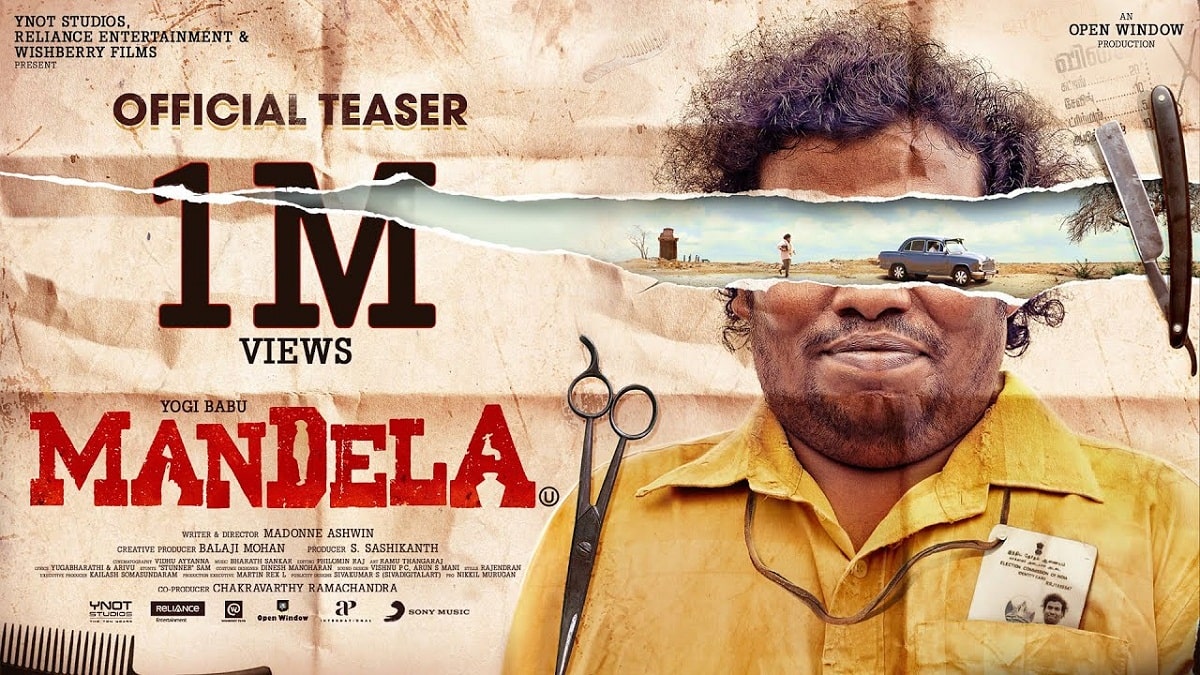
A ‘Mandela’ is required to restore India’s electoral morality
Lest you are flummoxed, the Indian “Mandela” is a Tamil movie (with subtitles) that was released a few days back on Netflix. One of a series of new wave films, thanks to newfound opportunities in the world of OTT, Mandela neatly captures the crisis that Indian elections are confronting -- with loads of dark humour, satire and an uncanny resemblance to a dominant political party. One character, for example, extols nationalism while another promises Rs 15,000 to each individual in the village if he is elected.

After fighting apartheid in South Africa, “Nelson Mandela” has arrived in India to expose the farce that elections have tended to become.
He is the unsuspecting victim of a brazen buyout of the most potent weapon any adult Indian citizen possesses – the vote. And, the arclight is firmly on the scourge of polarisation that has corroded the innards of the country’s adult suffrage system.
Mandela may have died some seven years ago, his body safely buried in his ancestral Qunu village, but that has not prevented a resurrection of an Indian “Mandela” — a namesake who roughly resembles the original in looks.
Lest you are flummoxed, the Indian “Mandela” is a Tamil movie (with subtitles) that was released a few days back on Netflix. One of a series of new wave films, thanks to newfound opportunities in the world of OTT, Mandela neatly captures the crises that Indian elections are confronting — with loads of dark humour, satire and an uncanny resemblance to a dominant political party. One character, for example, extols nationalism while another promises Rs 15,000 to each individual in the village if he is elected.
Coincidentally, we are in the midst of an election season. West Bengal is going from violence to more violence in each of its eight phases of polls. Three other states (Tamil Nadu, Kerala, Assam) and a Union Territory (Puducherry) have just seen the conclusion of an energy-sapping election where politicians, who otherwise are generally not approachable, were seen crawling out of their comfy woodwork – folding hands and beseeching votes from an otherwise forgotten electorate.
Also read: The many Karthiks of Tamil cinema
“Mandela” reflects the revolting reality of our times where political parties don’t hesitate to provoke people based on their beliefs and identity and divide them on that basis – all for the power to rule.
A slight slip-up either in screenplay or direction would have ended up showing up Mandela as a tired caricature of reality. Instead, the narration and denouement are spot-on with just the right mix of humour, seriousness and realism. This is creditable as Tamil cinema routinely suffers from melodrama, egregious action and mushy sentimentalism.
Two groups in a tiny village, led by half-brothers representing two different castes, fight desperately to win a local election. The election to the local council is a high stakes game as investment worth several crore rupees is riding on the winner. The two groups do a quick count of the votes they can get. It results in a tie. All each candidate needs is that one extra vote to win.
And their gaze falls on Mandela. Played by Yogi Babu, Mandela is the village’s go-to guy for getting a haircut, shave and to run errands for everyone – all for free. He gets shouted at, spat upon, robbed and exploited in every way possible. He has no identity. None remembers what his parents named him at birth.
Also read: Return of Big Government under Biden is good news for the world
To help him get a voter id, a Samaritan names him Nelson Mandela.
Mandela represents the unseen and marginalized, who are sought out from their hovels once in five years. He sleeps on the branch of a sprawling banyan tree, and is accompanied by a factotum, who shares in his ordeals.
Mandela’s vote, the decider, turns his world inside out. For someone who is the butt of ridicule, anger and the recipient of everyone’s frustration, Mandela becomes a VVIP overnight. The two candidates get into a frenzied competition, playing the genie to a bemused Aladdin. Mandela’s innermost wishes are fulfilled — a shiny mirror, all the latest gadgets that a barber must have, and even a full-fledged RCC-roofed salon next to the banyan tree.
Also read: Caste in Tamil cinema: Karnan raises the bar
It reminds the viewer of the latest election in Tamil Nadu where political parties promised free gas cylinders, internet connectivity, solar stove, mosquito nets etc.
As the polling day arrives, Mandela feels the sharp tug of the string attached to all the goodies. The script takes a twist, turns a corner and then re-emerges – this time with a bruised, beaten and wiser Mandela doing the unexpected.
In the celluloid world of ‘Mandela’, the scriptwriter has the freedom to play God and surprise viewers. The tail merrily wags the dog, and the wry humour lends itself to a feel-good emotion.
Unfortunately, in the real world, which Mandela attempts to represent, the dog-head is very much in control and the tail is nowhere nearing wagging free. Religion and caste are very much available for exploitation, communities with a history of conviviality mindlessly turn against each other while false identities are erected by a powerful section of politicians with the sole, cynical purpose of getting that one wretched vote.

